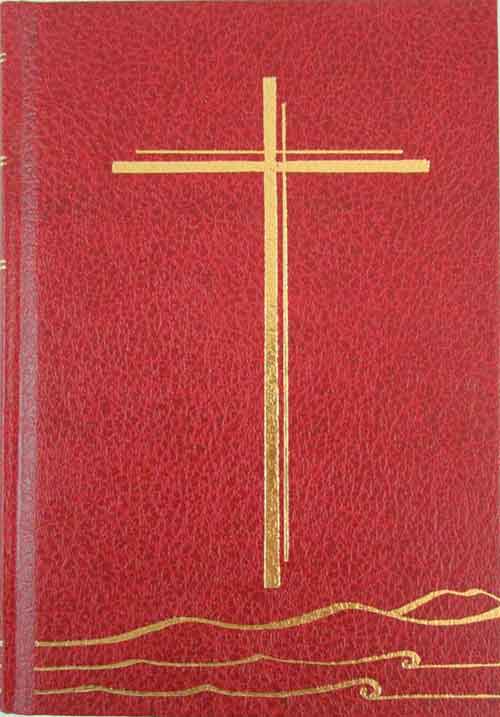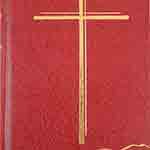
In The Anglican Church in Aotearoa, New Zealand and Polynesia (ACANZP), diocesan synods and hui amorangi are being asked to assent to various statutes. If they are passed by a majority, they will return to General Synod Te Hinota Whanui (GSTHW) for confirmation and become formularies of our Church. So here are some thoughts.
You can find the statutes here.
Statute 733 The Endings of Collects Amendment Statute, 2018
Well, we begin with a pretty weird one.
Let’s first make sure we know what the current agreement of our Church is:
A New Zealand Prayer Book He Karakia Mihinare o Aotearoa (ANZPB/HKMA) page 549 has
At the end of a Collect, when needed, the minister may add
and then it gives seven options which may be added. “May” means any other endings may be added.
And, don’t forget, that the collect is not a requirement at the Eucharist in ACANZP (see what is required at ANZPB/HKMA pages 511-514). So, to summarise our Church’s current agreement: in a Eucharist you may or may not use a collect (or collects), drawn from any source or made up previously or on the spot, and with (or without) any ending. The Prayer Book provides some suggestions for such collects and for optional endings.
Aside: anyone who has been around this site a while will know that I see the Collect as the heart of The Ministry of the Word and Prayer, collecting the prayers of the gathering community, drawing us together into the life of God the Holy Trinity by addressing the First Person of the Trinity through Christ, whose Body we are part of, in the power of the Spirit.
So, a couple of meetings of GSTHW ago, they decided that they wanted to change those optional examples of endings provided in the Prayer Book. Being a formulary of our Church, that went round all the diocesan synods and hui amorangi for assent. As required, the majority of the diocesan synods and hui amorangi assented to the change.
But, at the last meeting of GSTHW, they, in their wisdom, decided not to confirm this alteration. They have changed their minds and have now sent different optional endings round all the diocesan synods and hui amorangi for assent.
So that is what diocesan synods and hui amorangi are voting on in this statute.
I told you it was weird.
Whatever is voted for – nothing alters in our actual agreement. As currently, in a Eucharist our agreement will be (whatever the outcome of the vote) that you may or may not use a collect (or collects), drawn from any source or made up previously or on the spot, and with (or without) any ending. The Prayer Book will provide some suggestions for such collects and for optional endings.
Statute 736 The ‘A Form for Ordering the Eucharist’ Amendment Statute, 2018
This is pretty straight forward.
We have agreed to A Form for Ordering the Eucharist which is essentially a set of headings giving the elements in a Eucharist. It allows for using Eucharistic Prayers in the Prayer Book on pages 420, 436, 467, and 485, or the framework on pages 512-514. Instead of the rubric indicating those pages, that rubric would be changed to
The presiding priest uses one of The Great Thanksgivings authorised by the General Synod/te Hīnota Whānui, or the following
So far, so obvious.
Note 1: Inexplicably, the rubric as it currently stands, does not allow the use of the Te Reo Maori Eucharistic Prayer, pages 505-507!
Note 2: Fascinatingly, the rubric as it currently stands, does not allow the use of the brief Eucharistic Prayer, pages 731-733, I have often encountered its use by clergy who think that the Eucharistic Prayer should be short. Others then argue that this is misusing this particular prayer which is “For use with individuals or small groups to meet special pastoral needs” (page 729). Certainly, it is notable that the Prayer Book Commission and previous General Synod meetings did not allow it with A Form for Ordering the Eucharist; and now that will be allowed.
Note 3: Notably, The Great Thanksgivings will need to be authorised by GSTHW. Even with the change to the Constitution allowing bishops to authorise rites locally, this statute does not extend this permission to authorising Eucharistic Prayers. This point strengthens the argument that bishops can only authorise rites when there is no formulary already for such a rite. That is, bishops cannot authorise alternative marriage liturgies, baptism services, confirmation rites, etc. [See further, the discussion towards the end of here]
Note 4: The framework Eucharistic Prayer provided in the Prayer Book (pages 512-514) needs improvement. The most obvious improvement: currently the prayer addresses the First Person of the Holy Trinity and asks, “Strengthen us… to be your body in the world.” I suspect the authors simply got their Persons of the Trinity confused (there’s a bit of a spin-the-bottle-and-see-which-Person-of-the-Trinity-you-land-on spirituality in ANZPB/HKMA). That should be “Strengthen us… to be Christ’s body in the world.” Furthermore, the framework could be more clearly flexible (it is flexible – but not clearly so). And it could include the option of having the epiclesis prior to the Last Supper story.
Statute 737 The ‘An Alternative Form for Ordering the Eucharist’ Amendment Statute, 2018
Back to another bizarre statute. This formulary has always been confused and confusing. This statute simply increases that confusion. Either rescind the whole formulary, or leave it as it is. See the full discussion on this statute here.
Statute 739 The Constitution/ Te Pouhere (Authorised Services – Te Reo Māori) Amendment Statute, 2018
Surely, this should have happened across the two meetings of GSTHW that changed our Constitution! I have consistently been against the change to our Constitution. But our Church has made the change in the English version of the Constitution but not in the Te Reo Maori version of the Constitution!
So we now have a change where we cannot now agree whether
1) Bishops can authorise any rite except they must use the ordination rite as agreed
2) Bishops can only authorise rites for which no agreement (formulary) currently exists (see an example of that in my Note 3 to Statute 736 above)
3) Bishops can authorise any rite whatsoever, even if an agreement (formulary) currently exists. This includes bishops being able to ignore the agreed ordination rite and authorise their own rite to ordain.
And now GSTHW has realised that the Te Reo Maori version of our Constitution adds to the confusion by differing from the English version!
Statute 740 The Title G Canon V, ‘Of Translations of Holy Scripture’ (Paipera Tapu 2012) Amendment Statute, 2018
This seems absolutely straight forward.
Statute 742 The Calendar – Te Maramataka Amendment Statute, 2018
This looks straightforward but is wrong. GSTHW intends it to read “from Ascension until Pentecost”. This is incorrect. If they are putting the effort into this twice-round formulary process, they should get it right. It should read “from Ascension Day to The Day of Pentecost”.
Note 1: It is called a “Week”, but, of course, it isn’t.
Note 2: If passed in this incorrect form, it is not going to fit on page 13 of the Prayer Book
Statute 751 The Constitution/ Te Pouhere Amendment Statute, 2018
This seems relatively straight forward, except (surprise!) the words before this declaration remain that one signs “in the form set out at the end of this Clause or in words to the like effect“. Yet again, we meet the Anglican Church of Or resulting in the current disagreement whether the Nelson Diocese’s declaration are “words to the like effect” or not.
Summary
In summary: New Zealand’s Anglican worship agreements are difficult to find – and when you find them there is disagreement about what we have agreed to. They are confused and confusing. At first blush, the agreements give a semblance of being carefully thought through, with a plethora of legal-sounding “Whereas” clauses, and so forth. But the statutes we are being asked to assent to increase the sense of confusion and “all the people doing what is right in their own eyes” (Judges 21:25).
If you appreciated this post, consider signing up for a not-very-often email, and/or like the liturgy facebook page…




Without getting too much into dispute into what is clearly a disputatious area of our church’s life, Bosco, I would hope that, whether via agreed interpretation, or via yet another clarification (!!), a church which agrees to reverse the rubric which currently allows any eucharistic prayer from around the Communion, might agree to give its bishop’s discretion re allowing for use in their dioceses, a few well-chosen eucharists from other provinces, providing they do not conflict with our formularies. Such discretion need not concomitantly involve ability to authorise alternative rites for ordination and baptism. But I take your point that what we have agreed to date, and what is doing the synodical rounds currently may not fit what I have just hoped for.
Thanks, Peter.
I agree that there are some very good Eucharistic Prayers that – now that I think there is no turning back from having a variety of Eucharistic Prayers in our “common prayer” – it would be good to be allowed to use in Aotearoa, New Zealand and Polynesia. How we might move forward to facilitate that might need some careful reflection. I would also note in this discussion that some of those well-loved prayers have different responses and “people’s parts” to our regular ACANZP ones.
I wonder if improving the (clear flexibility of the) Great Thanksgiving framework in A Form for Ordering the Eucharist might also be a way forward (one of my notes above).
Blessings.